Are Digital Nomads in Trouble? Well, Not Exactly.
Flexibility, freedom, and the ability to travel the world and earn money while you’re at it. The digital nomad lifestyle has got plenty to offer. But with border closures and travel restrictions being implemented all over the world, how has it been affected by the coronavirus pandemic?
In this podcast episode, we check in with seasoned digital nomad, Amanda Gaid in Mexico. She shares with us how she’s been coping and provides some valuable and practical tips and advice on how digital nomads should approach traveling and work.
Amanda explains how COVID-19 laid her personal plans to waste, and what it has done to the digital nomad community at large. As painful as it’s been, though, Amanda insists all is not lost. Not only does she cherish the lifestyle, but she explains why changes happening because of coronavirus – like businesses moving online and relying more on freelancers – might actually be an advantage for anyone with a digital nomad skillset.
If you prefer a summary, here’s a five-point TL;DR version:
- The digital nomad communities have been extremely helpful and supportive during this unprecedented period of time.
- If you’re looking to land new gigs, reach out to your personal contacts and check in with digital nomad communities for opportunities.
- Now’s the time to start building a digital skillset to improve and increase your value moving forward.
- The three things to consider when planning a next move are finances, visa issues, and safety.
- Keep an eye on how certain industries are doing to check for signs that could indicate a need for a career change.
Start Yours is a podcast about ecommerce, dropshipping, and all things launching a business.
Join us as we meet entrepreneurs who have gone through the triumphs and headaches of running an online store, and learn how they managed to survive and thrive.
David: Let’s start with the origins of your run as a digital nomad. So before you were a digital nomad, what were you up to? Where were you living? How did it kind of dawn on you that you could do the whole nomad thing?
Amanda: So, before I took my first trip, I was living in New York City. I’m from Central Florida and I had spent my whole life there, including school, and I actually lived at home to commute to school because it was just a 30-minute drive.
And so I got to New York in about 2012, and I was elated to have left Florida. It was really an incredible experience. I loved living in New York, especially, because it’s just so different from the sort of small-town vibe that I had.
But after two years, I realized that I was spending a whole lot of money to live in basically a glorified shoebox.
And I also have zero tolerance for the cold. As an Egyptian heritage and Floridian background, my ancestors are of the desert and my relatives are of the beach. No cold for me. And so, I basically fled to Costa Rica before my third winter.



How Digital Nomads Have Been Affected by the Pandemic
David: You recently wrote an article for Oberlo about what the Coronavirus pandemic has done to the standard digital nomad life, and the headline was “Nomadness”, which was poetic by the way, so good job on that.
→ Click Here to Launch Your Online Business with Shopify
And in this article, you wrote, “For some, the biggest misfortune is being bummed over their canceled summer adventures, and for others, it’s a dire emergency as they find themselves stranded abroad.” So I’m curious, between these two camps, which one do you find yourself in?
Amanda: I feel like I’m very much in the first boat because I’m definitely bummed over my canceled summer adventures, and I don’t feel that I’m stranded here, I feel that I made a pretty conscious effort or a conscious decision to stay here. So, I guess time will tell if I shift into the latter category.
David: And what were the elements of that decision? ‘Cause I can only imagine, you’re sitting in Mexico watching this thing unfold and it was every… Like, I wouldn’t even say that the circumstances were changing daily, it was like every 12 hours there was a new revelation or a new outbreak in a new country.
What was that like and what were the calculations that you were making as you were deliberating what your next moves should be?
Amanda: It was interesting to watch things unfold. It was just sort of a slow trickling, and I would say, in the beginning, it seemed like a no-brainer that I was just gonna keep moving forward with my travels and then that became clear that that was not gonna happen even if I still wanted it to.
I’ve been in this city that I’m in in Mexico for a total of seven months now, and so I’m quite comfortable here. I know the lay of the land. It’s a very charming cute little city. It’s very family-oriented, and I feel, I honestly feel a lot safer here than I felt in many places in the States.
I just feel that I’m comfortable and I know the lay of the land and I’m close to home, I’m not so terribly far away. And so, those were sort of my decisions for staying here.
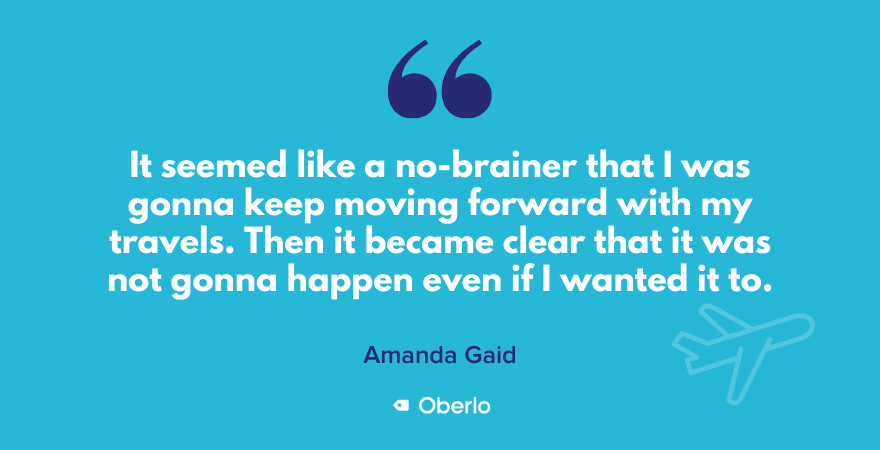
David: You have pretty deep roots in the digital nomad world. You literally wrote a book about it for us last year, which you can find on the Oberlo ebook library.
You’ve been living this lifestyle for years, as you mentioned, and you’re a member of the Facebook and Twitter communities that have emerged around the digital nomad lifestyle.
What sort of stuff are you seeing from people who, like kind of your counterparts in this digital nomad world? What sort of things are going on? What are people posting and saying and thinking as the Coronavirus has turned this lifestyle upside down?
Amanda: Oh yeah. I think it’s sort of similar to really anyone’s experience online right now, which is mostly madness, punctuated with good information.
A lot of posts I’m seeing in the digital nomad groups I’m in are a lot of polls actually. The people who are running the groups are very invested in knowing how the members are faring, and knowing what kind of support and content they can be creating for them, which is really comforting to see.
I’m seeing a lot of people using it for crowdsourcing, when they have really urgent information that they need, they’ll post it to a group, and a lot of times there will be people who might be in the area or have lived there extensively and have really great resources, they can sometimes help directly answer their questions or direct them over to someone who can or a resource that can.
But it’s a lot of people really just seeing how everyone’s doing and asking for help where they need it. And then there are a lot of toxic posts happening, but yeah, it’s everywhere on the internet.
David: Yeah, sure, it’s hard to avoid that stuff sometimes. I wanted to ask about the demand for your work, and I could see this swinging wildly, one of two ways. Maybe it’s completely dried up, ’cause companies are just slashing everything that they can or and also see where it’s increased because things are moving online that used to be in-person, and maybe you could step in for people who have been laid off and not that you’re in the business of capitalizing on people’s job problems.
But economies around the world have shed tens of millions of full-time jobs and I could see where there are a lot of circumstances where this sort of stuff that digital nomads have traditionally thrived on is suddenly front and center where maybe that was done by full-time employees as recently as a couple of months ago.
So, what’s happened to the ways that you’ve found work and the types of jobs that you’re finding? Has it gotten better or worse or is it pretty stable at this point?
Amanda: Well, I’m very fortunate in that I don’t have to do what a lot of, especially new work remote workers do, which is sort of grasping for clients and there’s a lot of trial and error that goes with finding a new client, seeing if they work with your style, making sure that you get paid, which is, sadly, a big issue.
But I’ve had two big clients that I’ve had for many, many years, and I’m very fortunate to have those stable relationships and not have to be constantly on the hunt for work. And I actually have more work from them since this started because I’m in content development, and I think content is one of the main ways that a lot of companies are responding to pivot if they need to and provide support to their customers and prospects in a new way because we’ve all got these new issues that need to be addressed. And I think a lot of the companies that are being proactive about addressing them are finding their way.
A Swing in Demand for Job Types
David: You said you’re not in the hunt for clients at the moment. I’m curious though, if you were, is there anything that you would definitely be doing? That maybe somebody who’s trying to land that second or third client should be thinking about? Are there any tips to nurture some stability here in these very unstable times for nomads who might be listening?
Amanda: Yeah, that can be a tough question. I would say that my first route would be networking, that’s how I’ve had a lot of experience.
Reaching out to personal contacts is definitely the first line of defense.
And the digital nomad communities actually are very helpful when it comes to posting open jobs and sort of nurturing people through how to develop new skill sets if that’s something that needs to happen. For some people, now might be the time to just, should go for something that they have historically never had a real motivation to do.
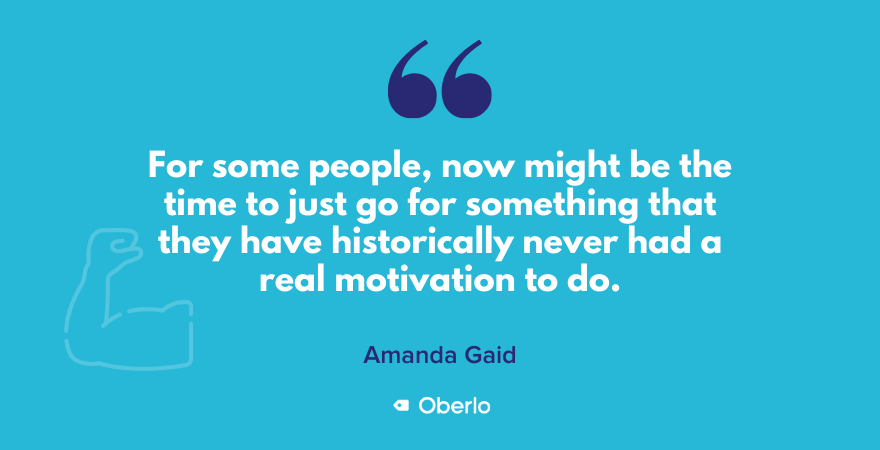
David: I wonder if you think the types of gigs that digital nomads gravitate towards are going to radically change because of all this Coronavirus stuff. Like in your ebook about digital nomads, for example, you called out a handful of remote jobs that nomads kind of have historically done.
So these included copywriter or web designer and of course, our favorite here at Oberlo, dropshipping.
I mean these are all ways of accumulating income that digital nomads have had a ton of success with. Are those “usual suspects”, so to speak, or are those still viable or have things dried up in the last few months, I mean how does the kind of conventional wisdom on the types of jobs, how is that holding up as we get a month or two into this new era that we’re in?
Amanda: I think that the types of things that digital nomads usually do will definitely ramp up because all these businesses have no choice but to switch to a digital version of themselves, and a lot of them are struggling a lot, obviously because they can’t really digitize their business model.
But for those companies that can, they’re really ramping up. And there are a lot of opportunities for people who have these sorts of digital skillsets.
And this is another reason why I think that now might be the time to really just try something that you’ve had your eye on that sort of a digital skillset because I think that your value will drastically increase moving forward.
David: Yeah, and it’s interesting, I mean you can just look at a tool like Google Trends, and there are so many searches and there’s so much interest in things that are just off the charts, compared to what it’s ever been. This is like across the board.
So you’ve talked about businesses moving online. I mean, if you look at the search volume that people are having on Google around those topics, it’s astronomical compared to 12 months ago, and then even things like video editing or photo editing, I mean there is a lot of very digital heavy things that that right now there’s so much interest in it and it’s hard to pinpoint who these searchers are or the exact reasons that this interest is exploding.
But I think your general point you can find corroboration for the idea that things are moving online and that the tech-savvy laptop-oriented, all you need is a WiFi connection, that sort of stuff is definitely not drying up and it actually seems to be going through a bit of a boom.
Who knows how long it’s gonna last, but the early returns on the demand for this sort of stuff that you’ve written about, that you’re talking about, it’s definitely peaking right now.
What Digital Nomads Should Consider When Planning Their Next Move
And so for you and for other people in a similar situation, I wanted to hit on some of the things that should be taken into consideration when plotting their next steps. And so, let’s start first with something that I think a lot of people are gonna wanna start with, and that’s money.
And so what are the variables to consider if someone’s trying to figure out if they can hack it abroad with what they have in their accounts or what might they take into consideration moving forward with how they might build up something to lean back on, just when it comes to this very, very basic question of, “Do I have enough money to support this lifestyle?”
Amanda: I think… Yeah, my first word of advice sort of goes to traditional Boomer financial advice, which is:
Do you have a safety net of at least three months, I would say, to six months?
And obviously the way to achieve this is to stop buying avocado toast. So that’s the first move.
I would say that, yeah, to be able to look at it from a worst-case scenario sort of lens is the best way to prepare yourself, like in the event that I did lose my income, am I completely screwed or can I manage? And I think that’s the biggest consideration and the smartest way to plan it.
David: And so, okay, fair enough. So let’s say you have the funds. There’s also the question of, and this is another very basic kind of a hierarchy of needs issue, where are you gonna stay when you’re abroad? And I guess there are a few aspects to this.
The first is availability. Are there rooms? Are there beds available? And then the second would be safety. And I’ve stayed in my share of hostels on, I guess, three different continents, and I can definitely think of a few places that I’ve laid my head at night that I would not wanna be during the height of an international health crisis.
So when it comes to this question of where to stay, what should people be thinking about when it comes to keeping a roof over their heads?
Amanda: Well, I think at this point if someone’s thinking of leaving, the biggest question is, “If I’m trying to go somewhere, can I even get in?”
And I think another consideration is visas and just how long your nationality can stay in a place in the event that you can get in.
Because I know that a problem that a lot of people are having is expiring visas but also immigration offices are closed. A lot of them have no way to know if you know what the penalties will be if they overstay their visa or if there’s any sort of special process that they have to go through to renew it.
So that’s definitely… I would say the number one consideration of choosing a place to stay because you definitely don’t wanna mess with the visa situation of any place that you are. Definitely, safety is a huge one. That was a big part of my decision also. I feel really safe here in this city that I’m in and that was a huge consideration for my decision.
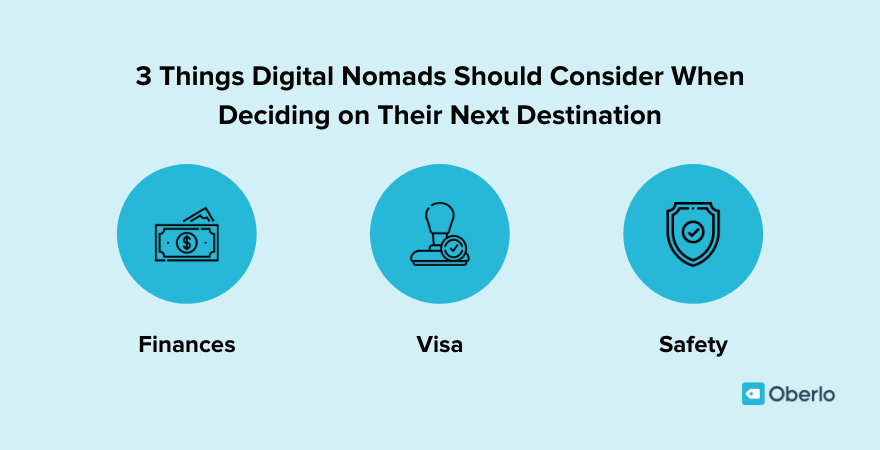
Digital Nomads’ Health Considerations
David: Alright. Last but not least and you just touched on it briefly but let’s dig into it a little more. That’s the topic of health and health considerations.
So questions like, if I get sick, do I have health coverage? Would I trust the health coverage? Could I communicate with the doctors? How are you approaching these sorts of questions and what are you seeing just kind of in the digital nomad world when it comes to this thing that’s very much top of mind for everybody right now?
Amanda: My approach is, again, just sort of feeling comfortable here and that’s what made my decision pretty easy.
The healthcare system in the city that I’m in is quite good. They’ve been building up for medical tourism for years now, so they have a lot of beds per capita and a lot of healthcare professionals. And I’ve actually been in and out of a few different medical facilities for various reasons since I’ve been here, and I’ve had really good experiences.
So I do have faith in the system here, and I also have health insurance, which historically is not something that I have done for myself. But I’m feeling pretty glad, I think that this something…
David: It’s a good time to do it.
Amanda: I’d done recently, it seems pretty timely. So I think that really being able to evaluate the medical costs, and I know that can be really difficult because you don’t necessarily know what you’re trying to evaluate.
But in a new country, you’ll just do the general cost of living, and do some research on what standard things cost in the healthcare system, which is, obviously, you have to be able to pay for the care in addition to get the care. So, I strongly encourage anybody who’s in a new place to look into their options for health insurance.
David: Would you be less willing to go to a place that has a dicey medical infrastructure, especially compared to where your head was at in 2018? Does what’s going on now change your calculation on what you would consider a viable place to set up shop for a little while to work?
Amanda: I think that that will definitely change. I don’t have any hard thoughts on it now because I think like most nomads I’m in a very day-to-day sort of mentality. But I do think that it will be a consideration moving forward.
And I think it’s just gonna be all about listening and watching and just hearing what these countries have to say about their own infrastructure, how welcome tourists are, trying to get as much information as I can, and just really trying to understand the impacts that it’s had.
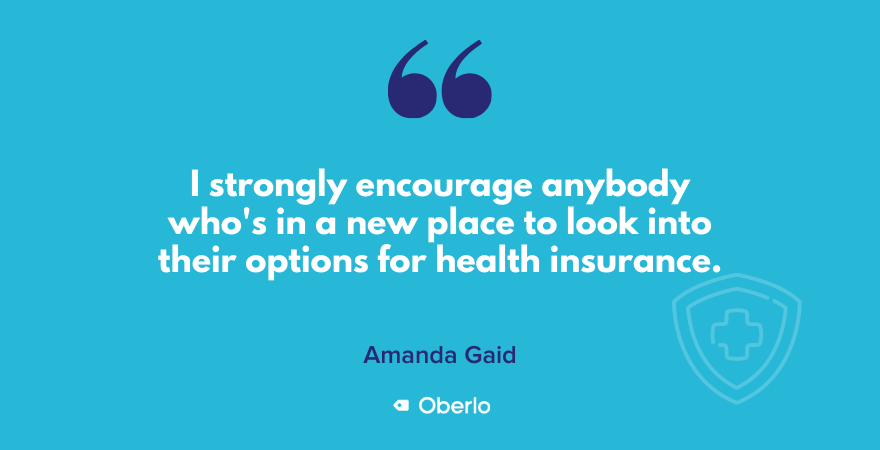
Taking It Day by Day
David: And so, what is next for you? It seems like you’re not going anywhere immediately. But even looking over the horizon a little bit, if things go well, then hopefully, the health crisis gets resolved in the next, I don’t know, a few months. I think at this point, it’s kind of an optimistic viewpoint.
If there’s some semblance of normality by the fall of 2020, do you know what your next moves might be, or maybe the digital nomad life has taught you to kind of fly by the seat of your pants?
What’s the calculation moving forward? ‘Cause I know that it was a very deliberate, well-thought-out decision of if you wanted to go back to the States versus stay in Mexico, and you kind of had to figure out what the pros and cons of that were.
How are you evaluating the next steps? Or are you evaluating the next steps, or is it like you said, just kind of a day-by-day thing at this point?
Amanda: It’s definitely a day-by-day thing, which is not too much of a change from my normal MO. Like you said, yeah, totally built for uncertainty, my lifestyle. So I think I’m very well-equipped in that sense.
Actually, I’m just thinking of staying in Mexico for the indeterminate future, as long as I really need to. My visa will be up mid-summer and so I’ll keep my eyes and ears on the ground to see how that unfolds as that happens and if I need to make any big changes.
But the renewal process is very easy. And I know that actually since the immigration offices are only taking emergencies right now, they’re actually waving any penalties for people who are overstaying their visas.
So I think as of right now, things are looking pretty safe for me, to stay for a while. And I do just like it here. So I think that I might just stay here possibly until next year, and then sort of try to reboot my summer travels, those plans that I had.
David: And those plans include coming to Berlin. So we hope to see you in Berlin, whenever people can fly again, that’ll be great.
Amanda: One day, I’ll be there, David.
Keep an Eye on How Industries Are Performing
David: Standing invitation. The last question for you, Amanda, then I’ll let you get out of here. So we talked about how you would evaluate the places that you might set up shop and the different considerations that go into that.
Does what’s going on now change how you or do you think it should change how digital nomads at large, how they approach the work that they’re doing? Is there any more emphasis on saving money now versus six months ago?
Or does the type of job that you’re interested in evolve at all as the circumstances are changing? I’m just curious if the conventional wisdom… Like if you read the ebook that you wrote last year where it talks about what to do and things to take into consideration etcetera, etcetera.
If you read that now, is there anything that would jump off as like, all of a sudden that logic is outdated? Or are things still intact? What’s the approach when it comes to work? Assuming you have the location sorted out, what does it look like going forward with the work question?
Amanda: I think, honestly, if I went back and read through my book, I would just add in a few sentences and paragraphs here and there. But for the most part, I think it’s all still pretty relevant because, in order to make the leap into a digital nomad lifestyle, you do really need to think about your finances and your job and your job stability.
And so, those sort of methodical calculations going into it are very much the same. But I think now there are just more factors to consider.
I think it would be wise to sort of try to keep on the pulse of how certain industries are doing.
And if certain industries are opening up and there’s a lot more demand in certain areas, like you said, Google Trends. So it might change the decision of what career path to go toward if somebody’s on the fence and they’re not quite sure. But I think yeah, generally speaking, I say my advice stands.
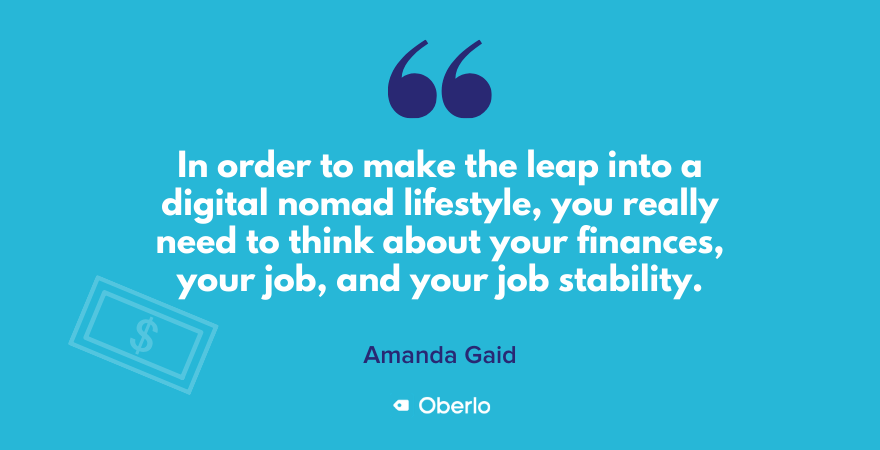
An Easy Transition to the New Reality
David: I lied actually, ’cause you just made me think of one more question. So you talked about, this is the last one, but then we can get out of here. But you just mentioned career path and does the fact that you kind of deliberately chose not to have a career path? I’m sorry, not have like a traditional career path.
Does that decision sting at all now with what’s going on with that the digital nomad thing has been turned upside down or maybe it’s the opposite of that. Maybe you think, if I had done the normal job thing, then I would never have a chance to do all the nomadism stuff that I’ve gotten to do.
Is there any looking back that’s going on now? Any lamenting of the career path that you’ve chosen given that there was this really unprecedented craziness going on.
Amanda: The short answer to your question is, “No.” No lamenting. This actually brings up something that I’ve been thinking about a lot lately.
I don’t know if you’ve seen any of those memes, like for example how an introvert has been training their whole life for this moment, like for quarantine. I sort of feel like digital nomads have been training for a pandemic, in a way. I know that that could sound a little bit insensitive, so that’s not what I’m going for.
But just the fact that our lives are built around uncertainty. Not even just we’re okay with uncertainty but we actually seek it, that’s how we get our kicks.
A lot of us are really minimalist. A lot of us have really low-cost, very, very frugal budgeting lifestyles. We’re already familiar with how to work online and remotely, which a lot of people whose jobs have sent them home to work online, a lot of people are really struggling with you know how do I use these project management tools, remote collaboration is hard, how do I stay productive during the day, how do I not eat the three weeks of grocery quarantine shopping that I’ve done.
I think that nomads have really ironed all of this out and so I don’t feel like too much has changed apart from… There are obviously very deep existential questions of, “What will my life be in a few months that really weren’t necessarily there before.”
But yeah, generally speaking, I feel very fortunate honestly because I see a lot of my friends who have taken a more traditional life path. Like, they have a 9 to 5 office job, and they have a house and a family, and their whole world is turned upside down and a lot of them are just really stressed out and really struggling.
And I’m over here like whistling, having the same day that I always have, so I’m feeling really fortunate for that.
David: Alright, that’s a wonderful spot to leave it. A nice upbeat ending. Amanda, thanks so much for taking the time to chat, and you can check out a lot of work that Amanda has done for Oberlo about the digital nomad lifestyle, about how to make it work both before and after the pandemic.
So if it’s about digital nomads, and it’s at Oberlo, it probably came from Amanda and it’s all very, very good. So Amanda, thanks so much, we appreciate it.
Amanda: Thank you so much, this is great.



Want to Learn More?